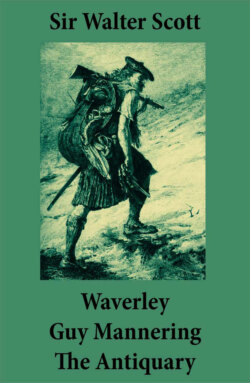Читать книгу Waverley + Guy Mannering + The Antiquary - Walter Scott - Страница 15
На сайте Литреса книга снята с продажи.
Bridal Song. To the tune of “I have been a Fiddler,” etc.
ОглавлениеAnd did you not hear of a mirth befell
The morrow after a wedding-day,
And carrying a bride at home to dwell?
And away to Tewin, away, away!
The quintain was set, and the garlands were made, —
‘T is pity old customs should ever decay;
And woe be to him that was horsed on a jade,
For he carried no credit away, away.
We met a consort of fiddle-de-dees;
We set them a cockhorse, and made them play
The winning of Bullen, and Upsey-fires,
And away to Tewin, away, away!
There was ne’er a lad in all the parish
That would go to the plough that day;
But on his fore-horse his wench he carries,
And away to Tewin, away, away!
The butler was quick, and the ale he did tap,
The maidens did make the chamber full gay;
The servants did give me a fuddling cup,
And I did carry ‘t away, away.
The smith of the town his liquor so took
That he was persuaded that the ground looked blue;
And I dare boldly be sworn on a book
Such smiths as he there ‘s but a few.
A posset was made, and the women did sip,
And simpering said they could eat no more;
Full many a maiden was laid on the lip, —
I’ll say no more, but give o’er (give o’er).
But what our fair readers will chiefly regret is the loss of three declarations of love: the first by St. Clore to Matilda, which, with the lady’s answer, occupies fifteen closely written pages of manuscript. That of Fitzosborne to Emma is not much shorter; but the amours of Fitzallen and Eleanor, being of a less romantic cast, are closed in three pages only. The three noble couples were married in Queen-Hoo Hall upon the same day, being the twentieth Sunday after Easter. There is a prolix account of the marriage-feast, of which we can pick out the names of a few dishes, such as peterel, crane, sturgeon, swan, etc., with a profusion of wild-fowl and venison. We also see that a suitable song was produced by Peretto on the occasion, and that the bishop, who blessed the bridal beds which received the happy couples, was no niggard of his holy water, bestowing half a gallon upon each of the couches. We regret we cannot give these curiosities to the reader in detail, but we hope to expose the manuscript to abler antiquaries, so soon as it shall be framed and glazed by the ingenious artist who rendered that service to Mr. Ireland’s Shakspeare manuscripts. And so (being unable to lay aside the style to which our pen is habituated), gentle reader, we bid thee heartily farewell.
97 Tailliers-hors; in modern phrase, Tally-ho
98 This tirade of gibberish is literally taken or selected from a mock discourse pronounced by a professed jester, which occurs in an ancient manuscript in the Advocates’ Library, the same from which the late ingenious Mr. Weber published the curious comic romance of the “Limiting of the Hare.” It was introduced in compliance with Mr. Strutt’s plan of rendering his tale an illustration of ancient manners. A similar burlesque sermon is pronounced by the Fool in Sir David Lindesay’s satire of the “Three Estates.” The nonsense and vulgar burlesque of that composition illustrate the ground of Sir Andrew, Aguecheek’s eulogy on the exploits of the jester in “Twelfth Night,” who, reserving his sharper jests for Sir Toby, had doubtless enough of the jargon of his calling to captivate the imbecility of his brother knight, who is made to exclaim: “In sooth, thou wast in very gracious fooling last night when thou spokest of Pigrogremitus, and of the vapours passing the equinoctials of Quenbus; ‘t was very good, i’ faith!” It is entertaining to find commentators seeking to discover some meaning in the professional jargon of such a passage as this.
